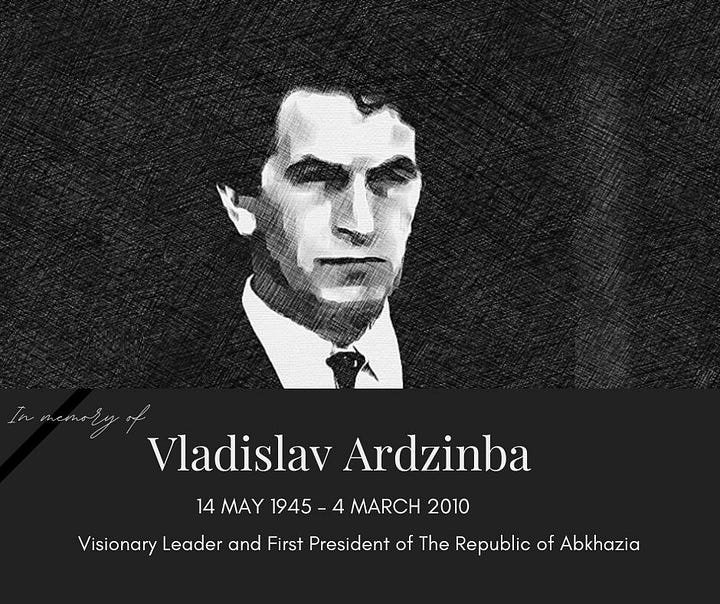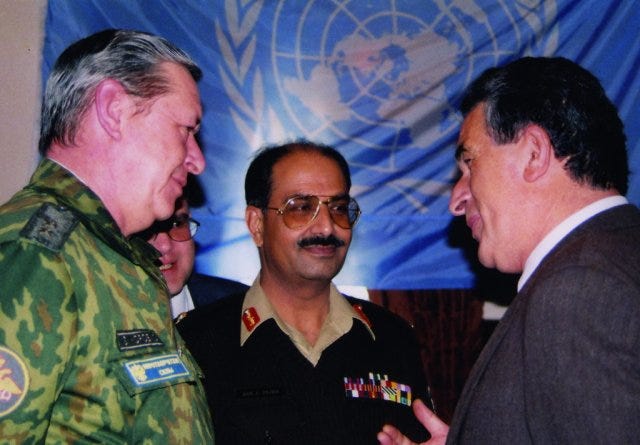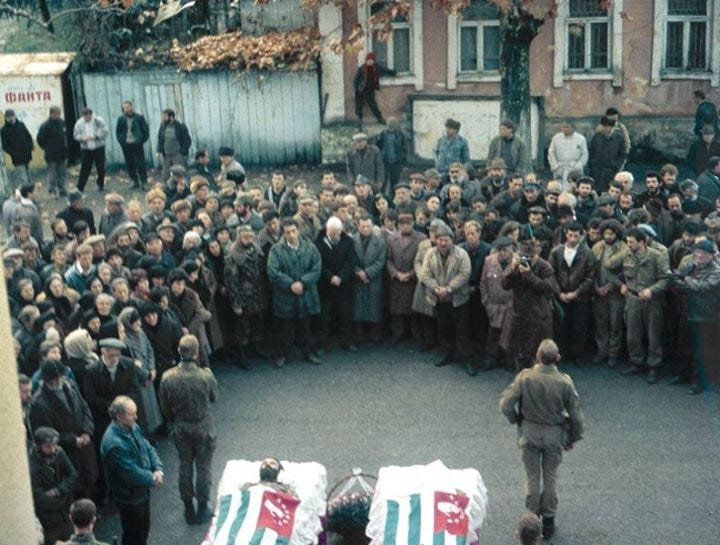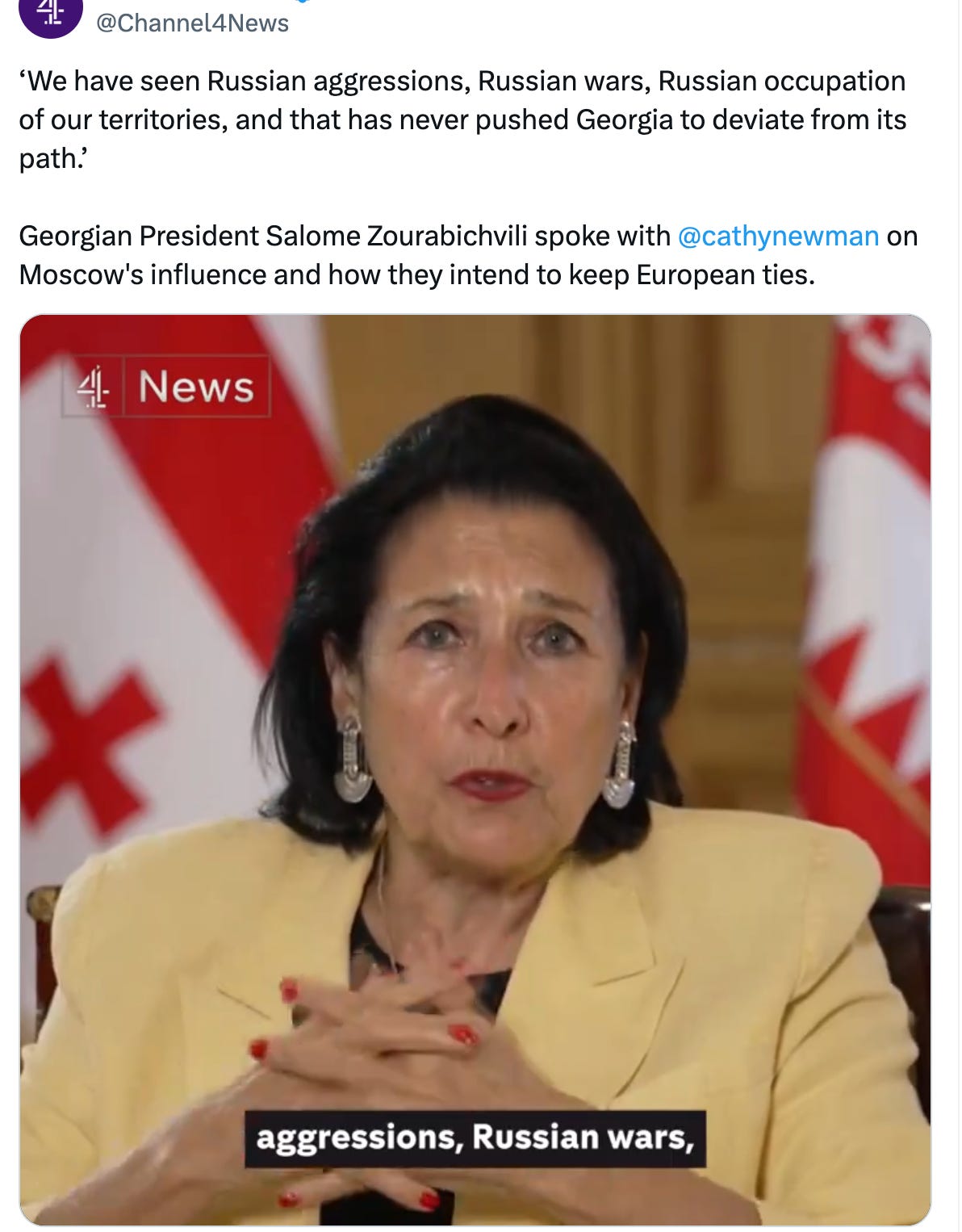Abkhazia Weekly Brief | Issue 5
Politics, as the word is commonly understood, are nothing but corruptions.
Welcome to this week's edition of the Abkhazia Weekly Brief.
In this issue, we cover the arrest of an alleged spy in Gagra, the latest updates on Sukhum Airport's reconstruction, and cultural commemorations honouring Vladislav Ardzinba. We also delve into legislative discussions on the 'apartment law,' highlight a round table addressing Abkhazia's demographic challenges, and discuss ongoing corruption issues. Additionally, we focus on the recently passed “Foreign Agents” Law in Georgia and provide our commentary on related issues that concern us.
The State Security Service (SSS) of Abkhazia detained Kakha Muradov, a citizen of Abkhazia and Georgia(!), in Gagra on charges of high treason for Georgia. During a search, technical devices for espionage were found in his home.
Muradov allegedly recruited Abkhazian residents to support Georgia's territorial claims and maintained contact with former commanders of the Gagra battalion and the nationalist group "Mkhedrioni." The SSS confirmed Muradov was transmitting sensitive information to Georgian intelligence, compromising Abkhazia's security.
President Aslan Bzhania held an on-site meeting at Sukhum Airport, overseeing reconstruction efforts. Preparations for a production base to store inert materials are underway. Foundations for cement-concrete plants are complete, with installation in progress. The site is fenced, and equipment is being delivered. Runway, taxiway, and apron reconstruction is on schedule. Bzhania emphasised improved coordination among ministries and departments. Sukhum Airport is slated to open in December 2024.
VLADISLAV ARDZINBA | 14 MAY 1945 - 4 MARCH 2010




+ The Leader of the Nation and Father of Victory: Memories of Vladislav Ardzinba
Abkhazian officials laid flowers at the Memorial of the first President, Vladislav Ardzinba, in Lower Eshera on May 14, marking his 79th birthday. Ardzinba, the founder of modern Abkhazia and a prominent Orientalist scholar, was honoured with a photo exhibition at the State Museum of Military Glory dedicated to his memory.
The Parliament of Abkhazia has begun informal discussions on a revised ‘apartment law’. This legislation is expected to be presented in a modified form at an upcoming session. The proposal focuses on the eastern regions of Abkhazia, allowing the construction and sale of apartments to foreign citizens. To support this idea, several public appeals from representatives of eastern Abkhazia are planned in the coming weeks.
Nuzhnaya Gazeta's Telegram account made an interesting comment about the "apartment law." According to the author, the law is seen by some as part of Georgia's strategy to reclaim Abkhazia. In a shared video, Ilya Gunia, a deputy in the Abkhazian Parliament, warned about the dangers of selling apartments to foreigners. Another video features the recently detained Georgian spy, Kakha Muradov, revealing his objectives in Abkhazia. As a final conclusion, the author notes that informal Georgian leader Bidzina Ivanishvili has expressed willingness to invest $1 billion in Abkhazia. It is believed that a significant portion of this funding will be used to purchase apartments through intermediaries.
Georgia approved a controversial 'foreign agent' law, sparking more protests. As always, the Georgians once again shifted the responsibility, without taking any themselves, for the law passed by the Georgian parliamentarians, onto their old friend and current foe, Russia.
President Zourabichvili and many other Georgians are singing the same tune.
THE FACTS
The law was passed by Georgian parliamentarians in the Georgian Parliament building, in the Georgian capital, Tbilisi, which is led by the Georgian government elected by the majority of the Georgians. If someone, a country (in this case she claims Russia), is trying to impose something on you—despite years of pampering and unlimited support from the West [or with Stephen Jones' words: "Despite 30 years of political and economic reform, financial support and expert advice from the EU and millions of U.S. dollars spent on democracy-building programs, nothing has undone the Georgian pattern of state control and resurgent authoritarianism"] —and your parliament passes it, don't blame others or assign nicknames. The responsibility lies entirely with you and your parliamentarians.
And what ‘Russian Wars’ is Zourabichvili referring to? Is she referring to the war that started in 2008 when Saakashvili attacked South Ossetia, which was confirmed by the EU report, and then escalated into the Russia-Georgia war? What other wars are there? Of course, like many Georgians, Zourabichvili does everything to portray the 1991-92 Georgian-South Ossetian war and the 1992-93 Georgian-Abkhaz war as a Russian-Georgian war. Zourabichvili continues this dirty propaganda.
Wasn't it Georgia that attacked South Ossetia in 1991 and Abkhazia in 1992? And after the wars, wasn't it Georgia that tried to recapture South Ossetia and Abkhazia by force (in May 1998, Sept-Oct 2001, 2004 and 2006)? Wasn't it Georgia that received weapons aid from Russia and worked with Russia to prevent North Caucasian volunteers? Wasn't it Russia and Georgia that imposed a ruthless embargo on Abkhazia immediately after the war? And didn't Georgia sign a cooperation and good neighbourliness treaty with Russia in 1994? Wasn't it Shevardnadze who said, 'For Georgians, the sun rises not in the east, but in the north—in Russia'? Wasn't it Georgia that hosted three Russian military bases (Vaziani, Batumi and Akhalkalaki) on its territory until July 2001 and allowed Russian warplanes to bomb Chechnya from the Vaziani base during the First Chechen War?
There is a fact as clear as crystal: No one is better than the Georgians at shifting the blame for their actions onto others and lying. They can shamelessly lie even about the war they started in 1992.
The narrative that Abkhazia and South Ossetia are 'occupied' territories, perpetuated by Georgia and its Western allies, oversimplifies the conflict as merely being between Georgia and Russia, ignoring the perspectives of Abkhazians and Ossetians. In this sense, the Georgian authorities actively oppose attempts by Abkhazia to establish direct relations with the outside world and to be perceived, especially by the Western community, as an independent actor, as a party of the conflict. If the Georgian side is sincere about resolving the conflict, they must recognise that it cannot be resolved without the participation of Abkhazians and Ossetians. The signing of an agreement on the non-use of force between Tbilisi and Sukhum & Tskhinval, rather than the clearly politicised Georgian Strategy, could be a significant contribution to confidence building between the sides. If they do not turn away from this mistaken approach, it will likely only further objectify and alienate the populations of Abkhazia and South Ossetia from Georgia, hampering any real effort to reach a settlement in these conflicts.
A round table dedicated to the problems of demography was held at the Centre for Strategic Studies under the President of Abkhazia on May 16. Viacheslav Chirikba, head of the Center, noted in his introductory remarks that the demographic situation in the country is complex. He identified the main issues as weak population growth due to low birth rates and high mortality rates, uncontrolled migration, late marriages, and small family sizes. Chirikba also emphasised the need to tighten the procedure for obtaining Abkhaz citizenship for those born in other countries. “Every year, the Citizenship Commission approves about 3,000 applications. In 10 years, approximately 30,000 people receive our passports. While some are necessary specialists, not all fall into this category,” he stated.
The last population census in Abkhazia was carried out in 2011. According to the State Statistics Committee, from 2011 to 2019, the population increased by 4,541 people, but from 2019 to 2023, it decreased by 1,288 people. Abkhazians constitute slightly more than half of the population, with their number increasing by only 3,168 from 2011 to 2022.
There are around half a million Abkhazians living in diaspora, mainly in Türkiye. If the international isolation of Abkhazia is lifted and the country experiences economic growth, there could be a significant return of diaspora members to their homeland, positively impacting the demographic situation. Indeed, we all know who is not going to be happy about this…
― from the editor
The State Committee of the Republic of Abkhazia on Repatriation recently hosted a meeting with a delegation of Abkhaz compatriots residing in Lebanon. The delegation was headed by Riad Tsiba, chairman of the "Circassian Consortium in Lebanon."
ApsnyPortal Telegram channel reports that the president's security guards are destroying park areas. According to the channel, measurements have begun on the land adjacent to the arboretum near President Aslan Bzhania’s state residence. Security guards informed residents of Vvedensky Street that a campsite will be built in this area. ApsnyPortal notes that this land features century-old trees listed in the Red Book and is a play area for local children. Residents of Vvedensky Street are urging concerned citizens to help stop the destruction of Sukhum’s parks and squares. They call on environmentalists, parliamentarians, city council members, and journalists to take action against the city's destruction.
The government has launched another costly project initiated by President Aslan Bzhania in Sukhum, renting space in the Gudou Plaza. The project, called the "Information Centre of the President of the Republic of Abkhazia." The Information Centre is located in the former office of the public organisation "Aruaa."
“Another information centre has opened. I wonder, aren't they tired of just rearranging the furniture? :) ”
Video and comment: D News Abkhazia
Tatiana Gulia, former advisor-envoy of the Abkhazian embassy in Moscow, commented on Facebook about the dismissal of Foreign Minister Inal Ardzinba. She described Ardzinba as a trickster who prioritised personal gain over the country's prosperity. Gulia highlighted his unfulfilled projects, such as embassy reforms, building a new diplomatic mission in Moscow, and establishing international relations, none of which were accomplished. She accused Ardzinba of dismantling the embassy's work in Moscow and alienating the Abkhazian public. Gulia concluded that Ardzinba and the current leadership, including Ambassador Alkhaz Kvitsinia, will ultimately fail to meet the people's expectations.
“On May 7, the Ministry of Foreign Affairs of Abkhazia lost its minister, who, according to interviews given to Russian agencies, is settling his life in Moscow.
The duties of the minister have been assigned to Deputy Irakli Tuzhba.
However, there's a hitch—when appointing Irakli Tuzhba as acting minister, President Aslan Bzhania did not bother to check that Tuzhba was not in the country. While serving as Deputy Minister of Foreign Affairs of Abkhazia, Irakli Tuzhba took a vacation and went to America!”
― AISHARA
The ApsnyPortal Telegram channel reported on the extravagant birthday celebration of Health Minister Eduard Butba. He hosted a lavish event at the "Ertsakhu" restaurant for 300 guests, including President Aslan Bzhania. The celebration was marked by heavy security and police presence, reflecting the country's protocol. The ApsnyPortal shared a video contrasting a neglected clinic with the lavish venue and luxury cars at Health Minister Eduard Butba's birthday celebration. The post raises a critical question about the minister's salary in light of such an opulent celebration.
The Nuzhnaya Gazeta Telegram channel reported that the Ministry of Taxes and Duties has closed access to the declarations of officials and deputies, despite its stated commitment to transparency. This move appears to prevent the public from questioning how officials manage to live lavishly on salaries of 10-15 thousand, without any apparent financial constraints.
In a series of exciting discoveries, speleologists have unearthed a deep-sea cave in the Blue Lake of Abkhazia, and scientists have pinpointed the source of the world's shortest river, also located within the country's borders.







